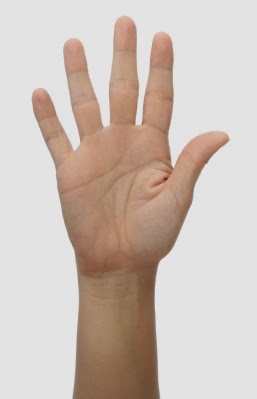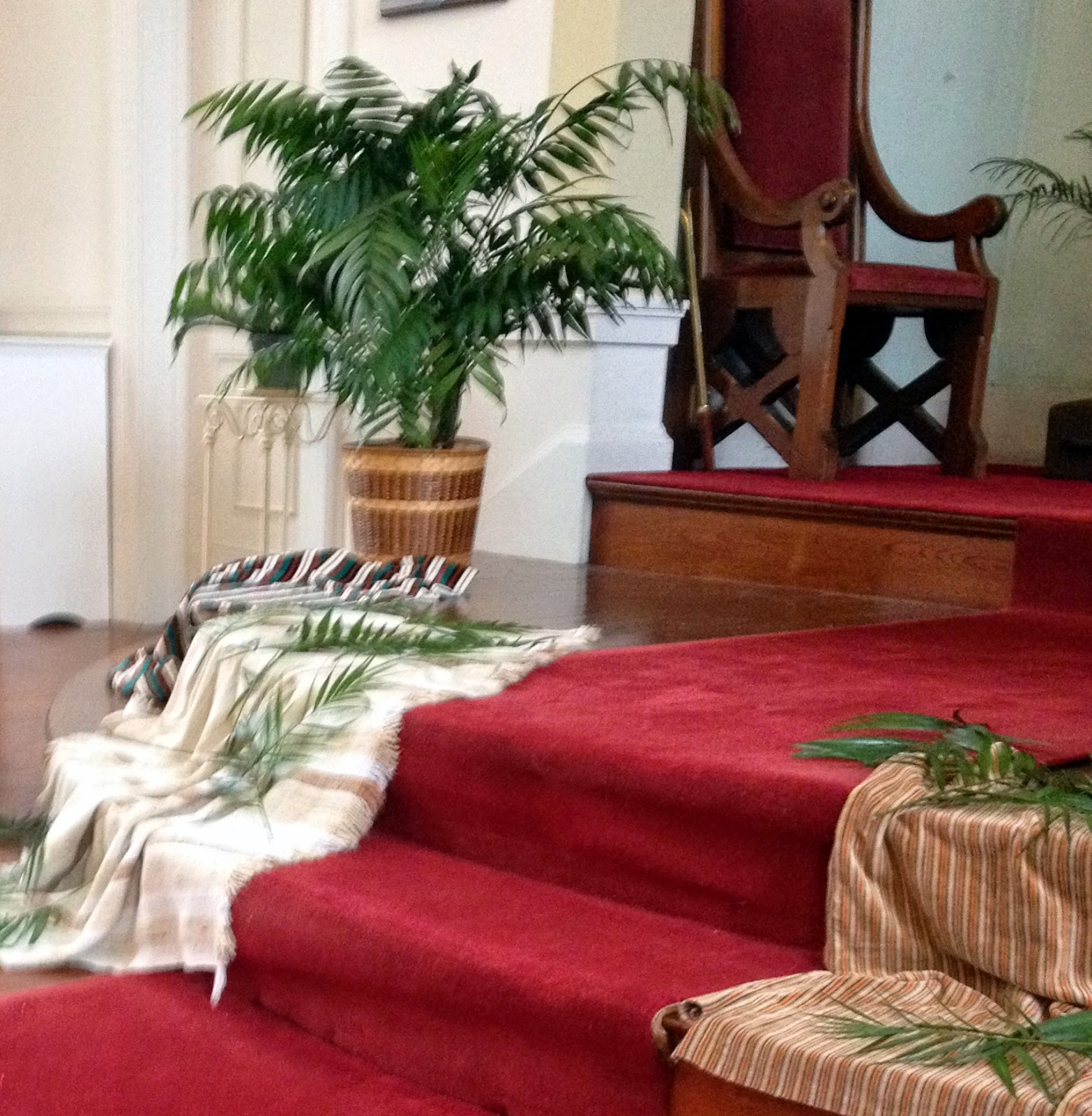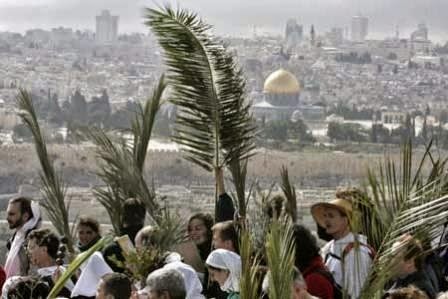Bath Church of the New Jerusalem
Psalm 143 portions; John 12:12–16; HS 7518, 7596 portions
Heavenly Secrets 7518. (Condensed)
"Fists," or palms of the hands,
signify power, because the "hands" signify power. Arms correspond to power; including the
shoulders and the hands, right down to the fingers. The reason for this
symbolism is that the body exercises its power by means of the shoulders, arms,
and hands.
Heavenly Secrets 7596. (Condensed)
“Spreading out the palms” is a physical gesture
or action, which represents a pleading from the heart. There are bodily gestures
or actions that correspond to every emotion or feeling. For example, falling
down on one's knees corresponds to humility, casting oneself down flat onto the
ground corresponds to even an greater personal humility, while a spreading out
of one's hands towards heaven corresponds to pleading from the heart, and so
on. In the Word, all described gestures
or actions symbolize the actual affections to which they correspond, because
they physically express such affections.
[A
heads-up. I will be inviting you to move
your arms during the sermon. I am hoping
most of you will be trying what I suggest. In any case, know that I give you
permission to do so, to deepen your experience.]
I
had my shoulder to the wheel this past week.
I have been giving the Chocolate Church a hand by performing in their “Jubilee” fund-raiser. So if I haven’t responded to your emails,
please don’t think I was giving you the cold
shoulder. Don’t judge me out of hand. I have had my
hands full. My right hand barely knew what my left hand was doing, I have been so
busy.
One
thing I love about Bath is its community spirit. It has a way of standing shoulder-to-shoulder, of walking arm-in-arm, and working hand
in hand, when something needs support. I hope no one was close-fisted when it came to buying
tickets for the show. Because the 17-degree lean on the Chocolate Church tower
is forcing the hand of the building preservation
committee. While no one should be reduced to a hand-to-mouth existence by supporting the Chocolate Church (or any
church!), it is otherwise all hands on
deck!
(With
apologies if I been a little heavy-handed
with these idioms. But what better way to show
you my hand?)
Here
we are on Palm Sunday, and the connection between these hand-shaped leaves and human
hands is strong. Palm branches take
their name from their resemblance to human hands. And, as we see illustrated in
today’s story, ancient peoples frequently grabbed them and waved them as an
extension of the hand, in praise, celebration, and adulation.
We
Swedenborgians love symbolism. We know that the study of Biblical symbolism,
and indeed all symbolism, can enrich and deepen our understanding of human
nature, of the Bible, and of how God works with us. So pay attention this morning, and open your
mind to the remarkable way our language and our bodies reflect our spiritual
realities. Our physical and spiritual
realities are far more connected than most people think.
Do
you talk with your hands? Actually, we all do, more than we realize. We
hide or show our hands based on how safe and connected we feel. Fold your arms across your chest. Your body is saying that you are unwilling to communicate
(in most cultures). Even putting your
hands in your pockets can disclose a certain level of disengagement. If our hands
are tied it means we are unable (or unwilling) to get involved at all.
We
show our palms to show openness. Putting
both hands over your head, or “hands up,” says around the world that we are
unarmed, mean no harm, or even that we surrender. We are showing that we have no weapons, or
that our hands are far away from our weapons.
For
this same reason the open palm and open hand symbolize truth and honesty. Two open palms say, “Trust me.” “Arms wide open” is a universal expression of welcome
and affection. We are letting someone in
to our personal space.
The
connection between our bodies and our internal state can be so strong that what
we do with our bodies can also change our inner state. Do you want to feel more closed and
defensive? Cross your arms. Do you want to feel more relaxed and open? Open
your palms. In fact, study subjects who have been told to lie while showing
relaxed and open palms had a much harder time not being truthful; and in a
separate study, individuals made to open their palms while being questioned
were more likely to tell the truth.
So, right
now, open your heart space—maybe even set your elbows on the back of the pew.
Relax your hands. Uncross your legs. Relax your jaw. Open your lips slightly. All of those things happen naturally when we
feel open. Doing these things with your
body can actually cue your nervous system that you are safe and relaxed. (Did you sigh? Your body was releasing stress.)
Arms
crossed over your chest is a defensive posture for a primal reason—you are protecting
your heart. Fists up, shoulders up and
head ducked is even more defensive—shielding your neck, chest, and vital
organs. People who feel frightened often
hug themselves. Trauma victims sometimes
curl right into a ball. Our inner state
is mirrored in our bodies in a correspondential way.
Spread
your fingers, wrists bent back and palms facing up (fingers are pointing away
from you, not back over your shoulders).
You are saying, “I’ve got nothing,” or “I don’t know,” aren’t you? Shrugging your shoulders emphasizes the
gesture. Now with elbows bent slightly, wrists
neutral, and palms facing forward, spread your hands. You have put yourself in “orans,”
whether your hands are hip-height, waist height, or shoulder-height. Orans is a posture of prayer and blessing
going back to very ancient times. You might notice me holding this posture with
one or both hands at the end of this service when I say the prayers and
blessings.
If
you spread your hands and stretch your arms up high over your head you are
probably showing jubilation, joy, and celebration. You could also be acknowledging a beloved
figure or leader. It is as if you are reaching out towards them, asking for
connection, blessing, and recognition. Put palm branches in those hands and your shout
of adulation becomes that much more expressive.
Today we use poster-boards or foam hands instead of palm branches in our
crowds of greeting and celebration, but the impulse and the meaning are the very
same. We are extending our reach. We are increasing the volume of our shout of
praise and cry of recognition.
 According
to Swedenborg, hands, palms, fists, and arms symbolize our power or our
“reach.” They symbolize the expression
of what is going on inside us, especially in regard to the intention of our
hearts. The show our friendliness or hostility.
They show our interest or disinterest in connection.
According
to Swedenborg, hands, palms, fists, and arms symbolize our power or our
“reach.” They symbolize the expression
of what is going on inside us, especially in regard to the intention of our
hearts. The show our friendliness or hostility.
They show our interest or disinterest in connection.
Spread
one hand, palm facing up, and extend it forward. This shows supplication. It is a form of submission or a request for
help. You are handing over your power. Perhaps you are asking for a hand. Turn that
palm down and suddenly you are saluting Hitler.
This one-palm-down gesture is a universal sign of dominance and
oppression, especially if you lift that hand above shoulder height and lock
your elbow. You are being high-handed and declaring that you have the upper hand. You are indicating that you might rule with an iron fist.
Face
your palm forward and bring it close to your shoulder. You are ready to swear allegiance or take an
oath. Place your hand over your heart and you are expressing love or devotion.
If
you are even-handed, it means you are
fair, or that you share power; you neither take nor surrender more than your
due. Someone who is even-handed would never palm the
proceeds. Besides, such sleight of hand, might mean you get caught red-handed. If that happened, your friends might wash their hands of you.
Today’s common hand shake is a ritual from ancient times. It is our way of saying that we do not have a weapon in our hand. In fact, the Roman soldiers’ full lower-arm grab was their way of checking that there were no weapons concealed up the sleeve either, because there have always been people who try to get around the conventions.
In
the Biblical book of Judges a man named Ehud got an upper hand by being left-handed.
Ehud’s job was to carry the Children of Israel’s tribute money to the king
of Moab. Being left-handed, Ehud carried
his dagger on the opposite side of his body than the usual. In this way he was able to sneak a weapon into
the Moabite king’s presence. Ehud’s underhanded tactic helped the Children
of Israel overthrow the Moabites and be restored to freedom.
In
fact, to this day the word “sinister” carries the suggestion of deviousness or
even ill-intent because left-handed warriors often had the advantage of
surprise. They were perceived as sneaky. But “sinister” is simply the Latin
word for “left.”
As
we head into Holy Week, and prepare to walk with our Lord through this darkest
time, may we pay attention to the powerful meaning of hands. The hands that came to heal us will be nailed
to the cross instead. Are we able to
admit in humility that there is something inside each of us that does this to
the Divine? Are we able to remember with
gratitude there is another part inside each of us that recognises the Lord for
Who He is, and that reaches to comfort Him on His walk toward the cross? It is these same inner hands that will
tenderly wash and anoint our Saviour for burial. And it is these hands that will be lifted in
prayer and praise on Easter morning when He rises again.
Amen
The
Readings
Psalm
143 portions
Hear my prayer, O Lord; give ear to my
pleas for mercy!
In your faithfulness answer me, in your righteousness!
Enter not into judgment with your servant, for no one living is righteous before you.
In your faithfulness answer me, in your righteousness!
Enter not into judgment with your servant, for no one living is righteous before you.
I remember the days of old; I meditate on
all that you have done;
I ponder the work of your hands.
I stretch out my hands to you; my soul thirsts for you like a parched land. Selah
I ponder the work of your hands.
I stretch out my hands to you; my soul thirsts for you like a parched land. Selah
Let me hear in the morning of your
steadfast love, for in you I trust.
Make me know the way I should go, for to you I lift up my soul.
Make me know the way I should go, for to you I lift up my soul.
Deliver me from my enemies, O Lord! I
have fled to you for refuge.
Teach me to do your will, for you are my
God!
Let your good Spirit lead me on level ground!
Let your good Spirit lead me on level ground!
John 12:12-16
The next day the great crowd that had come to the festival heard that Jesus was coming to Jerusalem. So they took branches of palm trees and went out to meet him, shouting, "Hosanna! Blessed is the one who comes in the name of the Lord-- the King of Israel!"
Jesus found a young donkey and sat on it; as it is written: "Do not be afraid, daughter of Zion. Look, your king is coming, sitting on a donkey's colt!"
His disciples did not understand these things at first; but when Jesus was glorified, then they remembered that these things had been written of him and had been done to him.
Idioms
heavily sourced from:




.jpg)



























